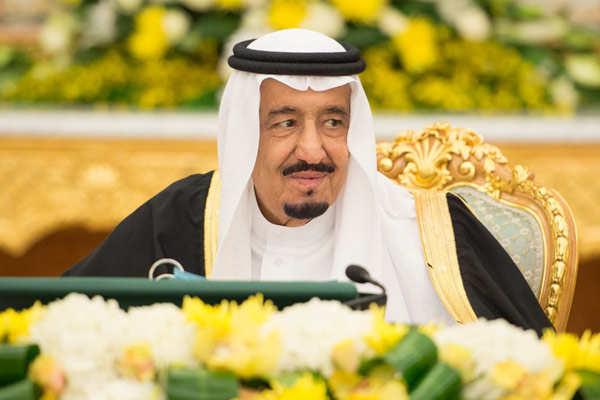
King Salman
Saudi approves $237bn budget for 2017; deficit cut
RIYADH, December 22, 2016
Saudi Arabia's Cabinet, which met today under the chairmanship of King Salman bin Abdulaziz Al Saud, has approved a SR890 billion ($237.28 billion) budget for the next year.
The budget envisages an 8 per cent increase in spending compared to the current fiscal year (SR825 billion), a Saudi Press Agency report said.
The budget projected a revenue of SR692 billion ($184 billion) and a deficit of about SR198 billion ($53 billion).
Oil revenues are estimated at SR480 billion, 46 percent higher than the 2016 projections. Non-oil revenues are estimated at SR212 billion, a SR13 billion increase over the 2016 projections.
The budget took into account initiatives of the National Transformation Program 2020 and allocated SR42 billion for this programme in 2017, in addition to the approved projects from the surpluses of the budgets of previous financial years.
King Salman said the budget is being presented in a volatile economic situation suffered by most states. The slow pace of global economic growth and fall in oil prices had impacted the country, and the state has sought to deal with these variables in a way that does not affect its goals, he said.
"Our economy is firm and it has sufficient strength to cope with the current economic and financial challenges, and this is the result of the prudent fiscal policies taken by the state. We are determined to strengthen the elements of our national economy, where we adopted kingdom's Vision 2030 and its programmes according to a comprehensive reform vision that can transfer the kingdom to broader and more comprehensive horizons to meet the challenges and strengthen its position in the global economy," he said.
"Our vision is not only a set of ambitions, but it is executive programmes to enable us to achieve our national priorities and provide opportunities for all through strengthening and developing partnership with the private sector, building a system capable of achievement, raising the pace of coordination and integration among all government agencies, continuing fiscal discipline, and promoting transparency and integrity," said King Salman.
"We have sought through this budget and its programs to improve the efficiency of capital and operational expenditures in the state, strengthen the situation of public finances, enhance their sustainability, give priority to developmental and service projects and programmes that serve citizens directly, contribute to activating the role of the private sector and increase its contribution to the gross domestic product," said King Salman.
"We are optimistic about our ability to achieve, with Allah's help and the support of loyal citizens of our country, the desired economic prosperity."
The Minister of Finance said the gross domestic product (GDP) of the kingdom for 2016 at constant prices would be SR2,581 billion, according to estimates of the General Authority of Statistics. The oil sector is expected to grow by 3.37 per cent, the governmental sector 0.51 per cent and the private sector 0.11 per cent. The oil refining sector achieved a growth of 14.78 per cent, the highest growth rate within the economic activities of the real total GDP.
He pointed out that the kingdom aims to strengthen its financial position and raise the efficiency of the
governmental spending as well as to reach a balanced budget by 2020.
It is expected that the total revenues for the year 2016 will reach SR528 billion, an increase of 2.7 per cent compared to 2016 budget estimates (SR514 billion), he said. It is also expected that the non-oil revenues will reach SR199 billion in comparison with SR181 billion estimated in the budget, he said.
It is expected that the government's expenditures for 2016 will reach SR825 billion, a decrease of 1.8 per cent in comparison to the 2016 budget projection of SR840 billion. This is 15.6 per cent less than that of the spending in 2015 (SR978 billion).
The main reason for the fall in spending was a decline in the pace of expenditures on the projects due to the measures taken by the government to cut spending and review existing and new projects.
Due to the measures taken in the field of spending, it is expected that the deficit will reduce in 2016 to SR297 billion after reaching its highest level in 2015 of SR366 billion. The deficit has been funded through borrowing from the domestic and international markets, the minister said.







